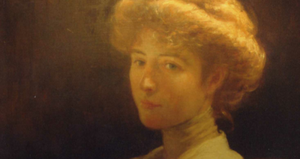
Katherine Githa Sowerby (6 October 1876 – 30 June 1970), also known under her pen name K. G. Sowerby, was an English playwright, children's writer, and member of the Fabian Society. A feminist, she was well-known during the early twentieth century for her 1912 hit play Rutherford & Son, but lapsed into obscurity in later decades.[1]
Rutherford & Son was first revived in 1980, and since then there have been several productions, including one at the Royal National Theatre in 1994 and, most recently, by Sheffield Theatres. A biography of Sowerby by Pat Riley, Looking for Githa, appeared in 2009, with a revised edition in 2019. In addition to several plays, Sowerby wrote books of poetry and short stories for children, illustrated by her sister Millicent Sowerby.[2] Her papers and memorabilia are in the collections at the Tyne and Wear Archives.[3]
Life and career
Sowerby was born in 1876 in Gateshead, England, into the Sowerbys, a glass-making family.[1] Her father, John G. Sowerby, was an artist and grandson of naturalist James Sowerby, and her mother was Amy Margaret Sowerby (née Hewison).[2] Sowerby married John Kendall,[2] and they had one daughter, Joan (1918-2013)[4]
Rutherford & Son was a "sensation"[3] and a "massive success"[5] in its 1912 London debut, running for 133 performances in London and 63 performances in New York.[1] Literary critic Barrett Harper Clark, writing in 1915, declared it "among the most powerful works of the younger generation".[6] It was also produced in Canada and Australia, and translated into numerous other languages,[1] including German, French, Italian, Russian, and Bohemian.[3] Originally produced under the pen name "G. K. Sowerby", it was only later revealed that the author of the hit play was a woman; Sowerby then achieved instant celebrity.[5] Sowerby's writing was compared to Henrik Ibsen's at that point, while known only by the gender-neutral initials "G. K."[7]
Bibliography
Plays
|
Children's books
|
Notes
- ^ a b c d Barbara Hodgson, "Author Is Brought Back to Life", The Journal, 17 September 2009.
- ^ a b c Parker, John, ed. (1922). "Sowerby, Katherine Githa". Who's Who in the Theatre. Pitman. p. 748.
- ^ a b c Mark Brown, "Githa Sowerby, the forgotten playwright, returns to the stage", Guardian, 14 August 2009
- ^ Riley, Looking for Githa, Revised edition 2019
- ^ a b BBC, "Tyneside honours forgotten writer" (26 August 2009).
- ^ Barrett Harper Clark (1915). "Githa Sowerby". The British and American Drama of To-day: Outlines for Their Study. H. Holt. pp. 154–155.
- ^ Rose Drew, "Patricia Riley on Playwright Githa Sowerby" Archived 31 January 2013 at archive.today, One&Other: York, 11 December 2011.
Further reading
- Riley, Patricia (2009). Looking for Githa. New Writing North. pp. 1–156. ISBN 978-0955882944.
- Riley, Patricia (2019). Looking for Githa. Stairwell Books. pp. 1–239. ISBN 978-1-939269-83-6.
- Gainor, J. Ellen (2013). "Rutherford and Son by Githa Sowerby, and: The Stepmother by Githa Sowerby (review)". Theatre Journal. 65 (4): 559–561. doi:10.1353/tj.2013.0103. ISSN 1086-332X. S2CID 194016179. (Subscription required)
- Stowell, S. (1994). A stage of their own: Feminist playwrights of the suffrage era. Ann Arbor, Mich: Univ. of Michigan Press. p. 129–156.
External links
- Woman's Hour on BBC
- "Githa Sowerby" Archived 24 October 2020 at the Wayback Machine, The Orlando Project
- Works by or about Githa Sowerby at Internet Archive
- A Man and Some Women: a play in three acts on Great War Theatre
